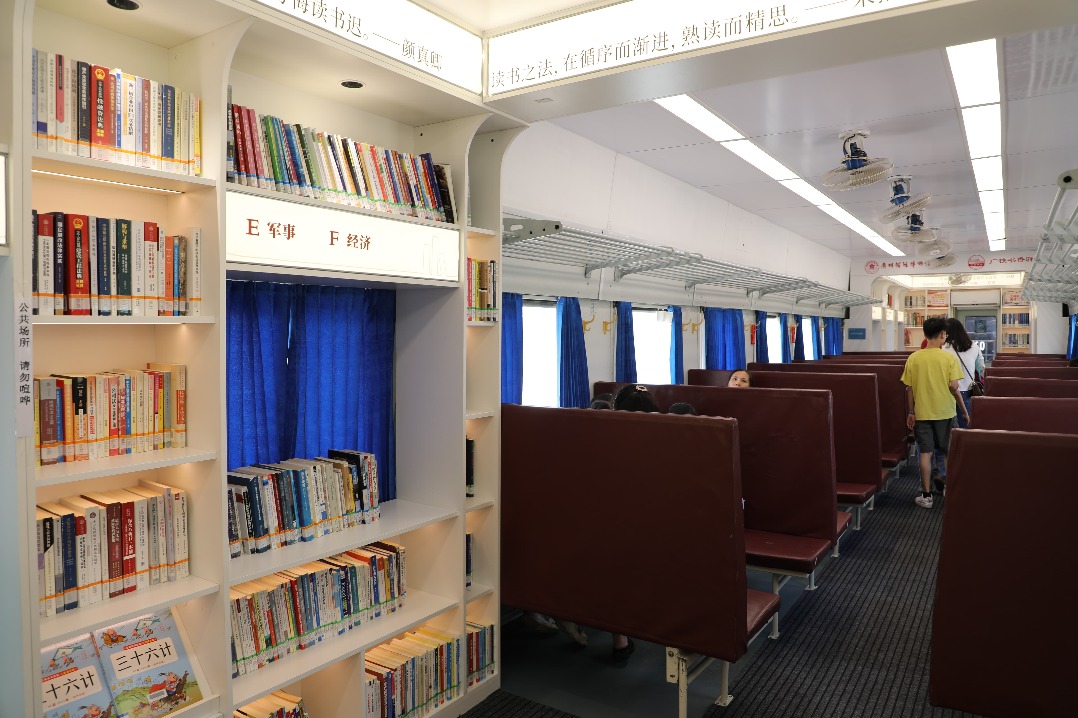Digital tech helps link countries, boost trade


Saikal Sabyrova, a 25-year-old from Kyrgyzstan, returned home in July after completing a year of study in China, armed not only with Chinese language skills, but also the ability to sell products to a digital audience.
Sabyrova studied Chinese at Qingdao, Shandong province-based College of International Languages and Cultures, which was jointly established by the China-SCO Institute of Economy and Trade and Shandong University of Science and Technology in September.
In addition to language training, her curriculum included livestreaming and e-commerce — skills she quickly put to use. She said that after trying livestreaming sales, she rapidly gained a significant number of fans, as the Chinese products she showcased are very popular among customers in Kyrgyzstan.
Like Sabyrova, many young people from member states of the Shanghai Cooperation Organization have ventured into digital technology businesses, highlighting the broader trend of e-commerce serving as a bridge for economic and trade collaboration among SCO member states.
According to Qingdao Daily, a local newspaper, the market scale of the online retail market of SCO member states exceeded $3.2 trillion in 2024, accounting for more than half of the global total. China's cross-border e-commerce imports from other SCO member states increased by 34 percent year-on-year.
Makhabat Alibekova, a 27-year-old from Kyrgyzstan, has also noticed a new trend in her home country. Kyrgyz people are now shopping for themselves on Chinese e-commerce platforms such as Taobao and Pinduoduo.
Alibekova said she noticed that the prices on Chinese e-commerce platforms are just so much more competitive. In fact, specialized courses have even emerged in Kyrgyzstan to teach people how to navigate Taobao, she added.
As the digital economy heats up, so does demand for skilled professionals. The China-SCO Institute of Economy and Trade, located in the China-SCO Local Economic and Trade Cooperation Demonstration Area in Qingdao, has emerged as a crucial hub for nurturing such talent.
Established in 2022 under the framework of the SCO, the institute offers specialized economic and trade training for people from SCO member states and countries involved in the Belt and Road Initiative.
"We officially launched our livestreaming and e-commerce courses in February 2022," said Zheng Shi, dean of the institute. "Since then, we have continuously expanded our e-commerce curriculum, introducing specialized programs such as the SCO Cross-Border E-Commerce Cooperation and Development Workshop."
To date, the institute has organized 15 e-commerce training sessions, attracting more than 1,500 participants from Pakistan, Kazakhstan, Russia and other SCO countries.
This year has been designated the "SCO Year of Sustainable Development". As one of the eight aspects of the Global Development Initiative, the digital economy is a significant focus of this year's collaborative agenda.
The China-SCO Local Economic and Trade Cooperation Demonstration Area is supporting this push by building its e-commerce service bases.
Zang Yuanqi, an official with the administrative committee of the demonstration area, said, "We are leveraging China's strengths in e-commerce technology, innovative applications and market scale to promote cross-border e-commerce development."
Zang highlighted the "Silk Road E-Commerce" comprehensive service base, which was launched in September last year and aims to address some of the most significant challenges in cross-border trade.
"The e-commerce service base offers end-to-end support, including integrated services, bonded storage and logistics, to accelerate and simplify complicated Customs procedures. It also uses exhibitions and shared livestreaming studios to boost product visibility and build trust," he said.
The service base has also served more than 40 enterprises through activities such as matchmaking events and livestreaming sales, generating more than 20 million yuan ($2.8 million) in transactions.
Elina Kim, a 28-year-old from Kazakhstan, emphasized the crucial role of the demonstration area as a networking hub that facilitates economic, trade and cultural exchanges with SCO member countries, enabling Chinese manufacturers to connect with international partners and overseas resources.
As deputy director of strategic development at Shandong Ha'ai Information Technology Group, Kim has helped four foreign companies to set up their Chinese subsidiaries in the area.
Said Bobur Saydakhmedov, a 30-year-old Uzbek who has worked in the area for four years, said: "There are numerous opportunities here for cross-border trade, logistics and industrial collaboration. My hometown has close cultural and industrial ties with China. Working here allows me to actively participate in bilateral and multilateral cooperation, which is a highly valuable experience for my career development."
- Digital tech helps link countries, boost trade
- SCO Summit to chart development blueprint
- China's 2025 summer box office surpasses 2024 as domestic films take the lead
- China targets online abuse of military veterans ahead of V-Day
- Qingdao-based area emerges as rising hub for regional growth
- Port city ramping up educational resources





































